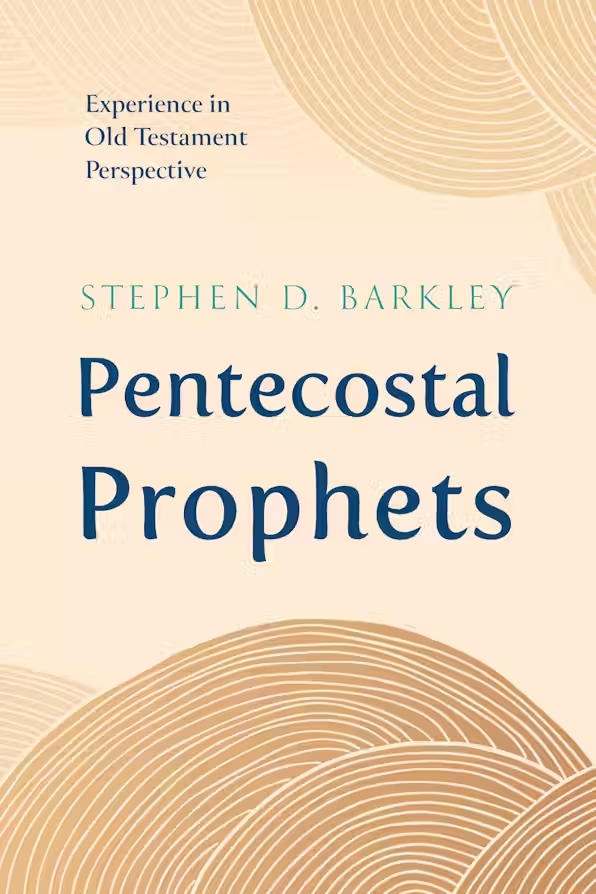Stephen Barkley: Pentecostal Prophets
 Stephen D. Barkley, Pentecostal Prophets: Experience in Old Testament Perspective (Eugene, OR: Wipf and Stock, 2023) 157 pages, ISBN 9781666768022.
Stephen D. Barkley, Pentecostal Prophets: Experience in Old Testament Perspective (Eugene, OR: Wipf and Stock, 2023) 157 pages, ISBN 9781666768022.
Stephen D. Barkley, director of pastoral leadership and campus pastor at Master’s College and Seminary in Ontario, Canada, offers an intriguing study on contemporary prophetic practice in the Pentecostal/Charismatic context. Barkley, being a Pentecostal scholar and practitioner, explores anew the prophetic ministry through the lens of socio-theological inquiry. His utilization of both social scientific lenses and theological lenses resulted in this empirical study that explores, analyzes, and consequently validates the sacramental and contemporary significance of prophecy in the Christian church today.
The prophetic ministry has been plagued by controversies both within and outside Pentecostal circles. Numerous publications have been produced in the theological effort of exploring, understanding, and analyzing the ongoing practice of prophecy in Pentecostal/Charismatic churches worldwide. Barkley joins the conversation by dialoguing Old Testament prophecy with present-day personal experiences in Pentecostal/Charismatic circles. Interestingly, he finds an avenue for dialectic conversation in the intersection of social science and theology. The resulting research became his dissertation, now published in this book form, Pentecostal Prophets.
The prophetic ministry has been plagued by controversies both within and outside Pentecostal circles.
Barkley validates the sacramental and contemporary significance of prophecy in the Christian church today.
Having clearly stated the book’s underlying assumption, Barkley describes charismatic prophecy as a “leitmotiv” in the Bible as well as in Christian Church history (11). Simply defined, prophecy for him, is a message communicated from God through a spokesperson for a recipient (whether a community, an individual, or an occasion) (13). Barkley affirms the centrality of prophecy in the ministries of Pentecostals, and its various streams like those affiliated with the Third Wave movement or those considered as Charismatic or Neocharismatic. For Pentecostals, prophecy or the prophetic experience is a key component of Christian spirituality.
How similar is prophecy and prophetic ministry before the coming of Christ to its practice after the Church began?
The book comprising of six chapters flows like a dissertation report, but with reader-friendly editing. In the first chapter the basic details of the study are clearly laid out, including research questions, assumptions, and methods. In chapter two, the literature review is presented. In said chapter, theoretical and empirical studies done on the practice of prophecy are thematically discussed. The chapter ends with Barkley by offering the study as a contribution to the ongoing theological discussion and a corrective to the over-emphasis on discontinuity between Old Testament prophecy and New Testament prophecy.
In chapter 3, Barkley discusses the experience of Hebrew prophets, specifically highlighting Jeremiah. In chapter 4, he presents data on contemporary experience of prophecy from personal experience, as well as from respondents who are practitioners in prophetic ministry. In chapter 5, the author brings both worlds of Old Testament prophets and contemporary prophets in dialectical conversation. The final chapter offers the author’s findings, limitations, conclusions, and suggested areas for research. The book is a tightly presented case for Pentecostal/Charismatic prophecy.
If prophetic ministry is biblical, as Pentecostal/charismatics affirm, can anyone fully understand its practice without experiencing it firsthand?
I recommend the book to those interested in understanding prophetic practice and spirituality. As Barkley explains, the book is beneficial to “the ordinary, the ecclesial and the academic” (17). His study certainly gives us a new perspective in understanding the similarities (or dissimilarities) between Old Testament prophetic practice and contemporary prophetic practice. It also provides insights into a specific context of prophetic ministry, namely that of the PAOC and PAONL. The theological reflections offered can guide the praxis and policy development of prophetic practice in Pentecostal/Charismatic churches today.
Reviewed by Lora Angeline E. Timenia
Publisher’s page: https://wipfandstock.com/9781666768022/pentecostal-prophets/
Category: Spirit, Winter 2024


